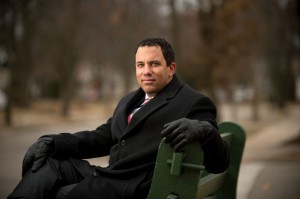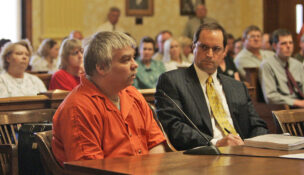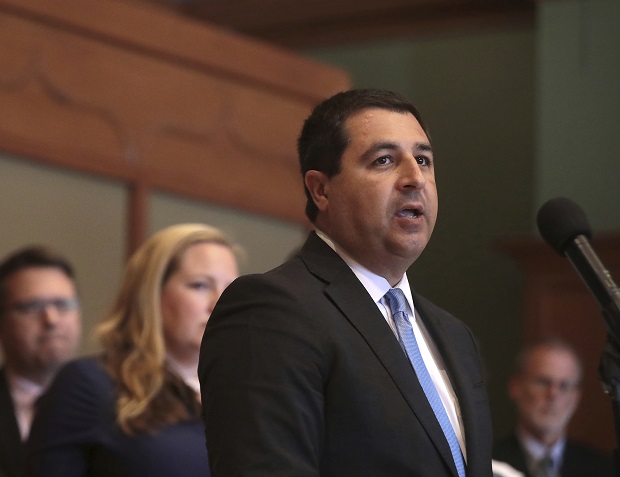More attorneys turning to colleagues for representation
By: Eric Heisig//January 5, 2015//

Milwaukee attorney Jeffrey Jensen has more than 25 years of experience in criminal defense, but he would put his fate in another lawyer’s hands rather than defend himself.
“As much as I know about criminal law,” Jensen said, “if, God forbid, I was ever charged with a crime, I would have somebody represent me.”
Attorneys who choose otherwise put themselves at a disadvantage, said Dean Dietrich, an attorney with Ruder Ware LLSC, Wausau.
“When a lawyer is representing himself, they are looking through the perspective they have, and they very much believe in the perspective,” he said. “They’re not able to switch and look at how the other person is viewing the issue and make arguments toward that.”
Yet plenty of attorneys have trusted themselves to handle their own cases, particularly in matters involving the Office of Lawyer Regulation.
But doing so is a mistake, said Nate Cade, a solo practitioner who handles attorney-discipline cases.
“Once it gets to the level where OLR is … further discussing some sort of penalty … you cannot be objective,” he said.
Choosing to hire someone can mean the difference between a suspension and a public reprimand, he said.
Gaining trust
Attorney clients are more difficult than nonattorney clients, Cade said, because they think they have all the answers.
“It’s hard to get them to let go,” he said. “Attorneys are afraid to put that in someone else’s hands.”
To do so requires a lot of trust, said longtime Madison attorney Stephen Meyer, who has represented many attorneys, including Daniel Rottier, of Habush Habush & Rottier SC, who was arrested in February for caning his wife. Rottier pleaded guilty to misdemeanor battery the same month and was given a deferred-prosecution sentence.
Those who have opted to hire Meyer often like to “check him out” first, he said. But once the conversation gets going, it often gets easier, he said, noting that attorneys are some of his best clients.
“I can give them advice, talk about different courses of action, and they understand what I’m talking about,” Meyer said. “It’s almost an easier dialogue than representing someone who is clueless and who you have to take your time with.”

Claude Covelli, an attorney at Boardman & Clark LLP, Madison, who does legal malpractice work, said the level of involvement varies among his attorney clients.
“Some are very hands-on and some are not,” he said. “It’s just like any other client. It depends on the client.”
But they all go to him for perspective, Covelli said.
“It’s really important to get a lawyer who’s disinterested and can look at it from a distance and see all the questions and issues,” he said, “and make sure the information that is provided is accurate.”
Growing awareness
Attitudes toward hiring counsel are shifting as the profession becomes more regulated, said Michael McChrystal, a professor at Marquette University Law School.
“The culture of the legal profession, once upon a time, was a lot more oral, with a handshake,” he said. “More and more, it has gotten more structured and formal in the way it sorts its own relationships.”
Law firms of all sizes increasingly are more “self-conscious of their own legal problems,” McChrystal said.
For some of the state’s largest firms, that has meant adding staff members specifically to manage the firm’s legal affairs, including lease negotiations, conflicts of interest and regulatory problems.
At Milwaukee-based Foley & Lardner LLP’s general counsel office, for example, there now are four full-time attorneys. A few years ago, there was only one.

Michael Wiesmann, director of risk management for Quarles & Brady LLP, Milwaukee, said his position was created a year ago and is indicative of the changing attitudes about lawyers needing lawyers.
“I think that emphasis is only going to increase,” he said, “because I believe that the client demands are going to increase.”
Max Welsh, deputy general counsel for Foley, agreed, saying clients subject to federal regulation, such as banks and large companies, want to be sure the firm is best equipped to stay within the bounds of the law. Attorneys who represent outside clients do not have time to handle tasks such as analyzing potential conflicts of interest, he said.
“Especially at big law firms like this and how busy our regular lawyers are,” Welsh said, “it’s extremely important to have full-time lawyers to address these issues.”
Despite increased awareness of the need for outside opinion, Cade said, it’s still hard to get past the first step of representation: trying to get attorneys to admit they were wrong.
“We are our own worst enemy,” he said. “There is stuff that a lawyer will do, that we would advise against doing, yet we persist in that action. Because we think, ‘How dare you tell me that what I did was wrong?’
“We can’t view it objectively.”
Legal News
- Steven Avery prosecutor Ken Kratz admits ‘mistakes were made’
- Colombian national extradited to Milwaukee faces International narcotics-trafficking conspiracy charge
- MPD: Milwaukee homicides down nearly 40 percent compared to last year
- EVERS: Republican lawmakers No-Show at special meeting to release statewide PFAS funding, stabilize healthcare access
- Wisconsin ICAC Task Force conference on Missing and Exploited Children highlights increase in sextortion cases
- More than 300 Wisconsin officers back in law enforcement after being fired or forced out
- Former Trump staffer who said to ‘fan the flame’ after 2020 loss hired to lead Wisconsin GOP
- Gov. Evers appoints David Casey to Serve as DOR Secretary
- Former Marine sentenced for Molotov Cocktail attack against Planned Parenthood Clinic
- ABA names 34th Annual Margaret Brent Women Lawyers of Achievement Awards honorees
- FBI launches criminal investigation into Key Bridge collapse
- Man charged in slaying after woman’s leg found at Milwaukee-area park
WLJ People
- Power 30 Personal Injury Attorneys – Russell Nicolet
- Power 30 Personal Injury Attorneys – Benjamin Nicolet
- Power 30 Personal Injury Attorneys – Dustin T. Woehl
- Power 30 Personal Injury Attorneys – Katherine Metzger
- Power 30 Personal Injury Attorneys – Joseph Ryan
- Power 30 Personal Injury Attorneys – James M. Ryan
- Power 30 Personal Injury Attorneys – Dana Wachs
- Power 30 Personal Injury Attorneys – Mark L. Thomsen
- Power 30 Personal Injury Attorneys – Matthew Lein
- Power 30 Personal Injury Attorneys – Jeffrey A. Pitman
- Power 30 Personal Injury Attorneys – William Pemberton
- Power 30 Personal Injury Attorneys – Howard S. Sicula











